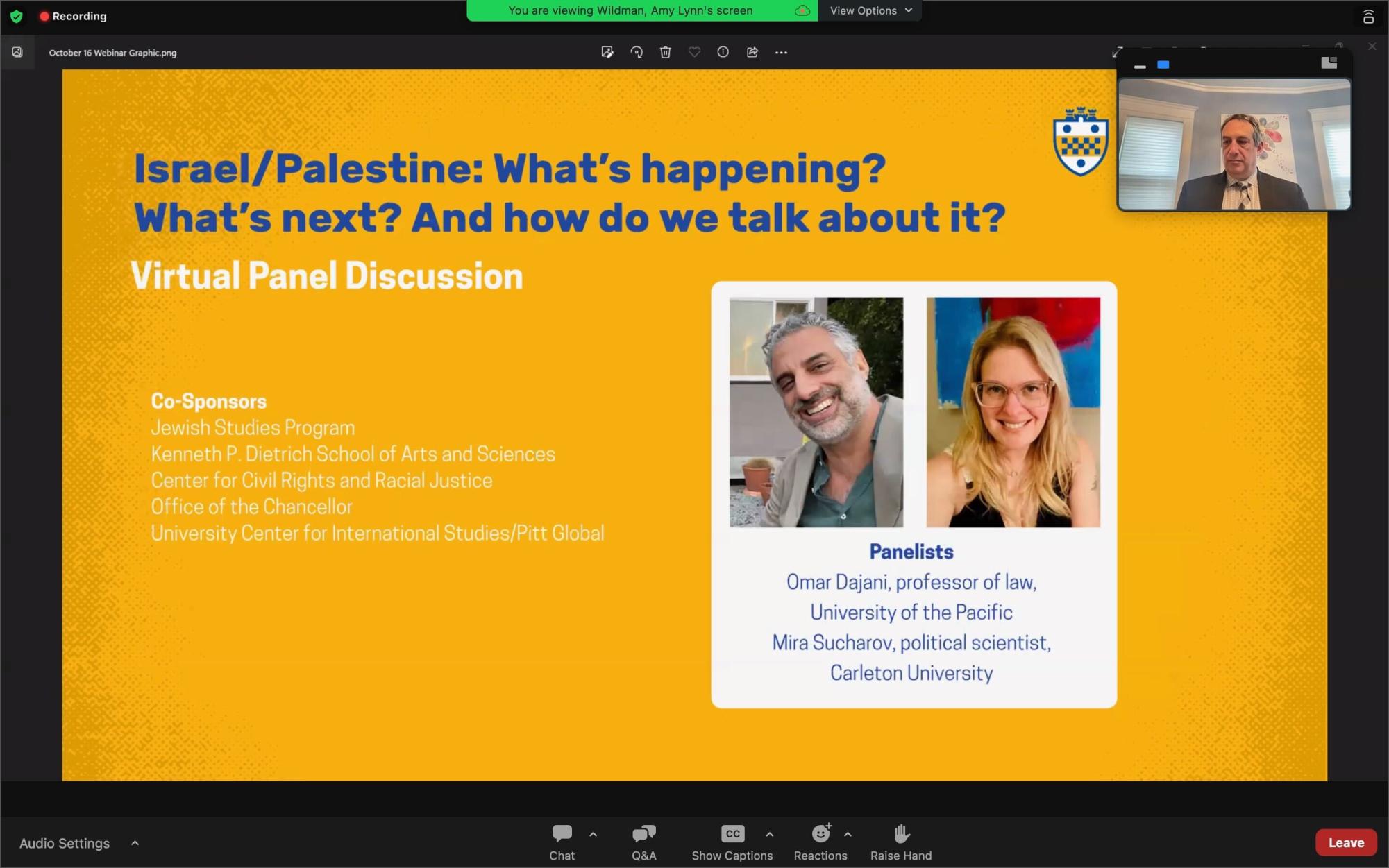Scholars discuss Israel, Palestine history and ways to talk about the conflict


Screenshot from a virtual panel discussion on Monday about the recent events in Israel and Palestine.
For Omar Dajani, professor of law at the University of the Pacific, there is a distinction between justification and explanation when it comes to discussing the recent attacks in Gaza and the history of Israel/Palestine.
Dajani said it is possible to provide a full explanation for the circumstances that cause individuals to take actions without justifying the actions.
“For me as a Palestinian, I am profoundly aware of the circumstances in which Palestinians in the Gaza Strip have been living,” Dajani said. “But for me, it was not difficult to say unequivocally that I condemned and looked upon with revulsion the act that Hamas militants engaged in.”
Pitt’s Jewish Studies Program, the Kenneth P. Dietrich School of Arts and Sciences, the Center for Civil Rights and Racial Justice, the Office of the Chancellor and the University Center for International Studies held a panel discussion on the Israeli and Palestinian conflict on Monday afternoon. Panelists Omar Dajani and Mira Sucharov discussed the history of the land and ways individuals should go about discussing the topic.
Sucharov, a political scientist at Carleton University, said it is important for individuals in a community to understand the differing points of view about the conflict. She added that she was deeply disturbed over how some individuals reacted to the attacks led by Hamas.
“We can also understand the rage of Israelis right now who want revenge,” Sucharov said. “I understand that, and I think I would feel the same. But that’s different from justifying collective punishment on the masses. It’s different than justifying cutting off food, fuel, and water. We can understand the emotions, but it doesn’t mean that we have to extend that understanding of emotional spaces to justify particular types of actions.”
The land today known as Israel, Gaza Strip and the West Bank was formerly known as the Mandate of Palestine that came under British rule before 1948. Dajani said it was important to bear in mind that Palestinians in the Gaza Strip view Israeli territory as a home that they long to return to. He said his own family came from the city of Jafa.
“In April of 1948, under bombardment by Jewish militias on each side of Jafa, militias that would within a month form what became the Israeli army when Israel declared independence in that month, Palestinians from Jafa fled fearing for their lives and looking for safety,” Dajani said. “Some of them, like my family, fled north toward Lebanon, but thousands fled south instead towards Egypt, and many stopped in the city of Gaza.”
On Friday, the Israeli government told Palestinians in the northern part of the Gaza Strip to leave their homes and evacuate to the south. Dajani said it’s important to understand that some Palestinians are not able to leave due to the limited space in the strip.
“Palestinians a few generations ago received similar calls to leave their homes during wartime,” Dajani said. “Subsequently, they were not permitted to return to their homes, and so when Palestinians hear a call like this to leave, what they hear is an echo of what we call the Nakba, the catastrophe of 1948.”
According to Sucharov, some argue that the land of Israel should belong to the Jewish community because Palestinians are a part of the Arab community and can live in numerous other countries. However, Sucharov said this argument is not convincing.
“We exist both in our relations to our communities,” Sucharov said. “We both have unique lives and unique houses. Just because Omar’s family heritage is part Syrian and part Palestinian, part Christian and part Muslim, and part French doesn’t mean that he should just pick one of those countries and be fine with his family home having been appropriated by the state and not having ever any right for his family to return or even get compensated.”
Dajani said he is still hopeful that there will be peace between the two groups. He added that there is an emerging movement called “A Land for All,” which consists of Palestinians and Jews working together to promote peace in the land.
“The reason that it gives me hope is two things,” Dajani said. “Number one, it is a movement that is premised upon values and on the belief that if we commit to the values of equality on the one hand and mutual self-determination on the other hand, that it’s possible for us even in a relatively small space to live together.”
Recent Posts
Opinion | School should be in the summer
Although this may be controversial, I believe that from this data, it is evident that…
Weathering the storm: Pittsburgh teams have tackled some of the toughest environments
The end of the year in western Pennsylvania is always marked by two things —…
Notes From an Average Girl // Notes on Book Banning
In this edition of Notes From an Average Girl, senior staff writer Madeline Milchman writes…
To Be Honest // Yup, it is that damn phone
In this edition of To Be Honest, staff writer Evin Verbrugge writes about her phone…
Meaning at the Movies | Portraying Toxic ‘Adolescence’
In this edition of Meaning at the Movies, staff writer Lauren Deaton explores the mini-series…
Opinion | Climate change requires radical, immediate action
Contributing editor Emma Hannan talks about the effects of climate change and the actions cities…

